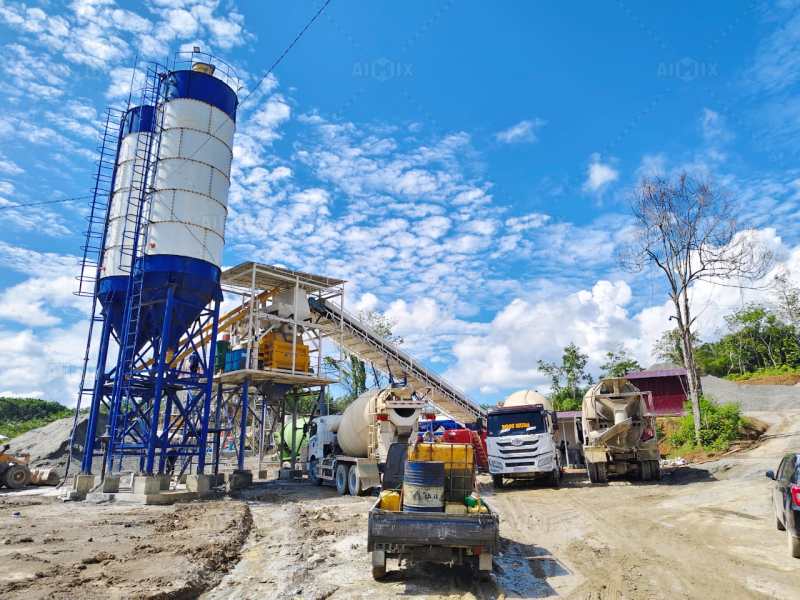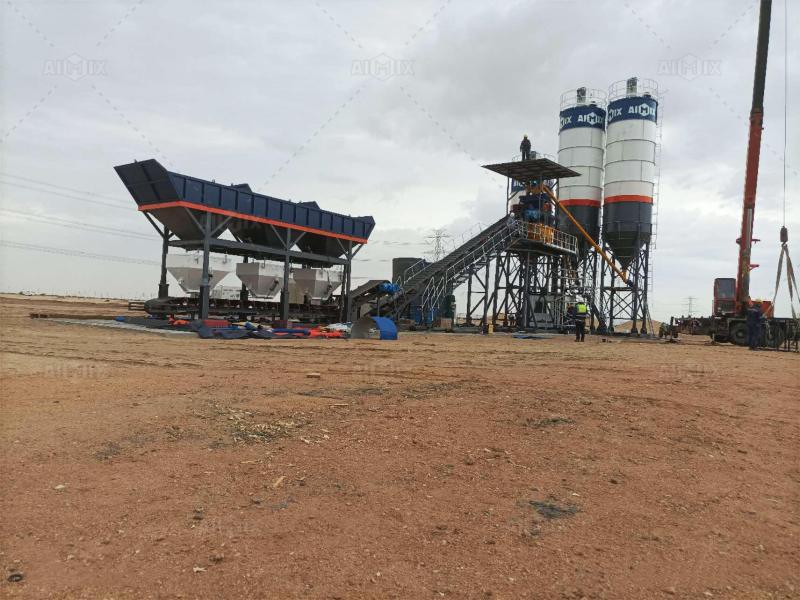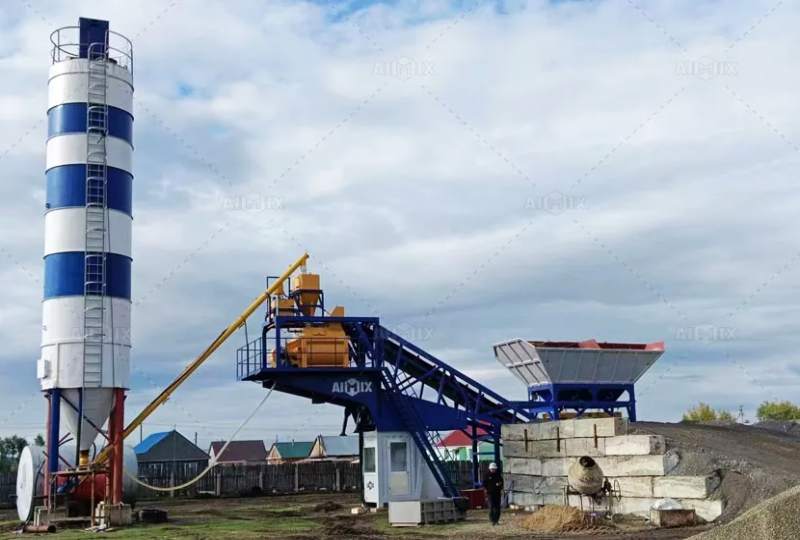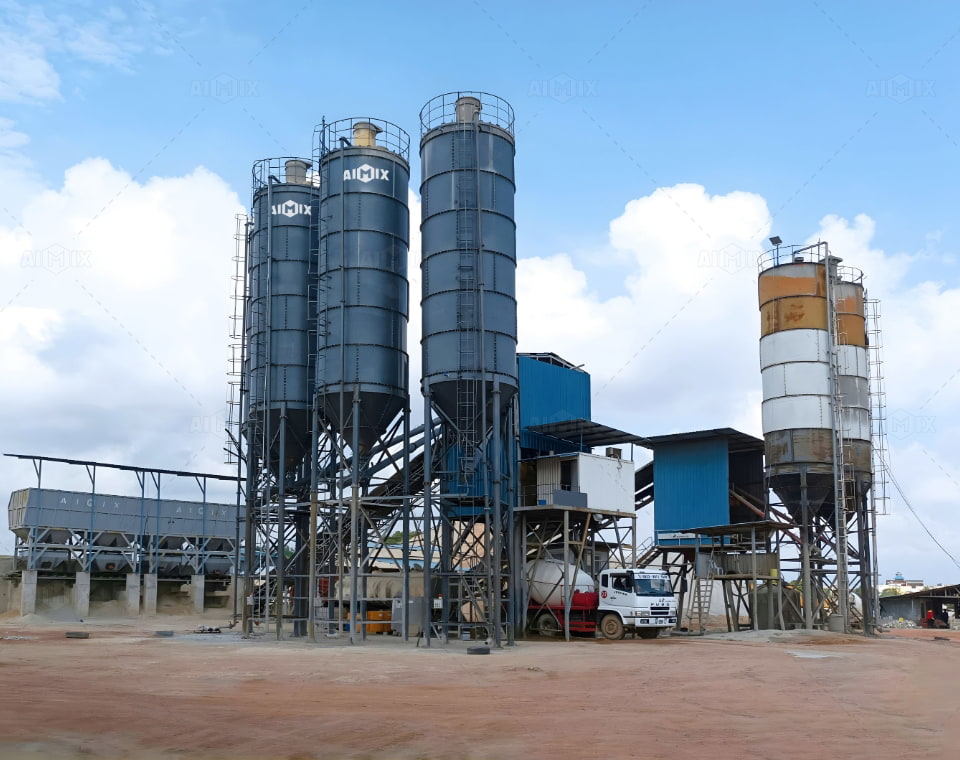A concrete plant is an essential facility in the construction industry, responsible for producing high-quality concrete efficiently and consistently. Whether for small-scale projects or large infrastructure developments, concrete plants play a vital role in ensuring a steady supply of concrete with precise proportions of cement, aggregates, water, and additives. With advancements in technology, different types of concrete plants, such as Ready-Mix Concrete (RMC) plants, stationary batching plants, and mobile concrete batch plants, have emerged to meet diverse project requirements. What is a concrete plant? This article explores the functions, types, and significance of concrete plants while highlighting their role in optimizing construction efficiency.

Understanding a Concrete Plant and Its Functions
A concrete plant, also known as a batching plant, is a facility that combines various ingredients to produce concrete. It consists of multiple components, including:
Cement silos for storing cement
Aggregate bins for sand, gravel, or crushed stone
Water tanks for precise water measurement
Mixing unit for blending materials uniformly
Control system for automating and monitoring the production process
The primary function of a concrete plant is to ensure consistent quality by precisely measuring and mixing raw materials according to project specifications. By using an advanced control system, concrete plants minimize material wastage and improve efficiency in concrete production.
Types of Concrete Plants
Concrete plants come in different configurations to cater to various construction needs. The three most common types are RMC plants, stationary batching plants, and mobile concrete batch plants.
A. Ready-Mix Concrete (RMC) Plant
An RMC plant is a specialized facility that produces concrete in bulk and delivers it to construction sites using transit mixers. These plants follow strict quality control measures and produce concrete with consistent properties, making them ideal for large-scale infrastructure projects.
Advantages of an RMC Plant:
Consistent quality: Advanced mixing techniques ensure uniform concrete strength.
Efficiency: Large-scale production reduces labor and time costs.
Reduced material waste: Controlled batching minimizes excess use of cement and aggregates.
RMC plants are commonly used in commercial buildings, highways, bridges, and large-scale infrastructure projects where a steady supply of high-quality concrete is required.

B. Stationary Batching Plant
A stationary batching plant is a fixed installation that remains in one location for an extended period. These plants are designed for high-capacity production and are ideal for projects that require a consistent supply of concrete over a long duration.
Advantages of a Stationary Batching Plant:
Higher production capacity: Suitable for large-scale projects.
Better precision and automation: Ensures accurate mix proportions.
Cost-effective for long-term use: Lower transportation costs compared to mobile plants.
Stationary batching plants are widely used in dams, airports, industrial complexes, and high-rise buildings where a continuous supply of concrete is essential.
C. Mobile Concrete Batch Plant
A mobile concrete batch plant is a portable facility designed for flexibility and quick setup. These plants are ideal for construction projects in remote locations or temporary job sites.
Advantages of a Mobile Concrete Batch Plant:
Portability: Can be transported easily to different sites.
Quick installation: Requires minimal setup time, reducing downtime.
Lower transportation costs: On-site production eliminates the need for long-distance concrete transport.
Mobile batch plants are commonly used for road construction, rural infrastructure projects, and temporary construction sites where mobility is essential.

Why Concrete Plants Are a Crucial Asset in Construction
The construction industry relies heavily on concrete plants due to their efficiency, quality control, and cost-effectiveness. Here’s why they are indispensable:
A. Improved Construction Speed and Productivity
By providing a consistent supply of concrete, batching plants reduce construction delays and ensure projects are completed on schedule. Whether it’s an RMC plant delivering bulk concrete or a mobile concrete batch plant producing on-site, concrete plants streamline construction workflows.
B. Cost-Effectiveness and Reduced Wastage
Modern concrete plants use automated batching systems to accurately measure materials, reducing excess use of cement, water, and aggregates. This lowers production costs while maintaining high-quality concrete output.
C. Consistent Quality and Strength
By using advanced mixing techniques, concrete plants ensure that each batch meets the required strength and durability standards. This is especially important for critical structures like bridges, highways, and skyscrapers.
D. Environmental Sustainability
Many modern batching plants, including stationary and mobile concrete batch plants, incorporate eco-friendly features such as:
Water recycling systems to minimize water waste
Energy-efficient mixers to reduce power consumption
Dust control measures to prevent air pollution

Choosing the Right Concrete Plant for Your Project
Selecting the right concrete plant depends on project requirements such as scale, location, and timeline. Here’s a quick guide:
| Project Type | Recommended Concrete Plant |
|---|---|
| Large-scale infrastructure (bridges, highways) | RMC plant, Stationary batching plant |
| Long-term industrial projects | Stationary batching plant |
| Remote or temporary projects | Mobile concrete batch plant |
| Residential or small-scale construction | Mobile concrete batch plant, RMC plant |
Conclusion
A concrete plant is a fundamental asset in modern construction, ensuring a reliable and efficient supply of high-quality concrete. Whether it’s an RMC plant for large projects, a stationary batching plant for high-capacity production, or a mobile concrete batch plant for on-site flexibility, choosing the right type of plant is crucial for optimizing efficiency and cost-effectiveness.
As construction demands continue to grow, investing in advanced concrete plant solutions can significantly enhance project success, reduce waste, and contribute to sustainable building practices.